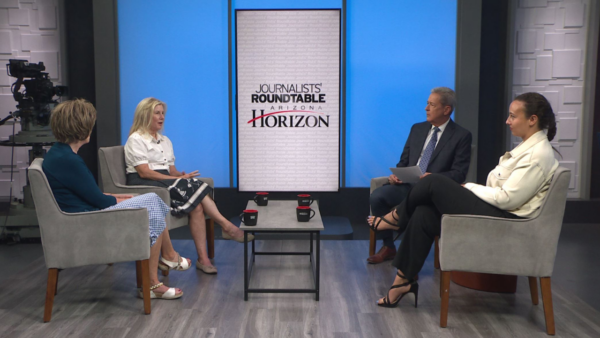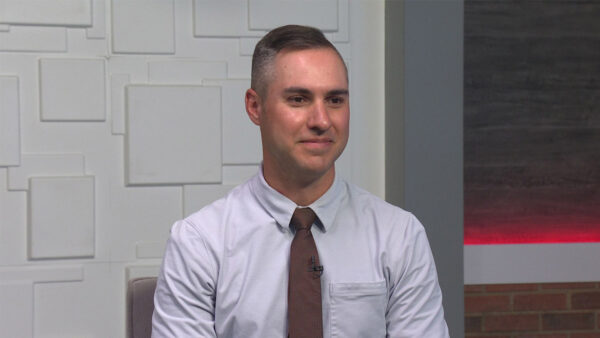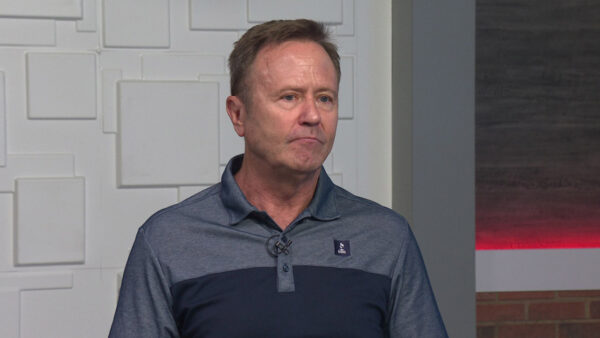Proposition 124 would make significant changes to Arizona’s Public Safety Personnel Retirement System to help save the underfunded system. Bryan Jeffries, president of the Professional Fire Fighters of Arizona, will tell us more.
Ted Simons: Coming up next on "Arizona Horizon," we'll look at proposition 124, which reforms the public safety pension system.
Ted Simons: Also tonight, we'll have an update on Arizona's tourism sector.
Ted Simons: And ASU's school of sustainability is celebrating its 10th anniversary. Those stories next on "Arizona Horizon."
Video: "Arizona Horizon" is made possible by contributions from the Friends of Arizona PBS, members of your PBS station. Thank you.
Ted Simons: Good evening and welcome to "Arizona Horizon," I'm Ted Simons. The upcoming special election on May 17th is mostly noted for proposition 123, which asks voters to approve using state land-trust funds to settle an education lawsuit. But the ballot will also include prop 124, which calls for significant changes to Arizona's public safety retirement system. Here to explain prop 124 is Bryan Jeffries, president of the professional firefighters of Arizona. We should note that there were no statements from anyone opposing prop. 124 filed with the secretary of state's office. That's why you're here and it's not a debate. Are you surprised that there's not a single voice of opposition to this?
Bryan Jeffries: I think just by law of averages I'm very surprised that somebody has not come out but I think there's one reason for that, that I think bodes in our favor is that a diverse group of stakeholders came together to create this and went through a lot of hard work to put it together and anybody who normally does not agree on this topic came together and negotiated and formed the agreement that is 124.
Ted Simons: Let's talk about proposition 124 here. What exactly does it call for?
Bryan Jeffries: So 124 is part of overall public safety pension reform that was enacted by the legislature this session. And I call it like the three slices of the pizza. The first slice doesn't have to go to the voters and that dealt with new employees. Second slice did some things to current firefighters and police officer. But the third slice is critical because it has to go to the voters for a one time change to the Arizona Constitution so what specifically does it do? We have had a benefit that was placed in several years ago that's been trying to keep police officers and firefighters when retired up with the cost of living. That benefit and the way it was paid for and structured within the system, we discovered after knowing through the Great Recession and the tech boom bursting that the structure behind that didn't work well and it actually was a major factor in creating our underfunding process. We've been giving out 4% compounding raises for the last 29 consecutive years in the current system and that has just proven to be unsustainable. Now under prop 124, the Constitution would allow us to change those benefits in the future and it would be based on the consumer price index. So if there's an increase, then we can give retirees an increase and if there's not, there's not. There's a 2% cap instead of 4%.
Ted Simons: Now, as the system stands now, it can really only cover half currently enrolled? That's a pretty tough shape.
Bryan Jeffries: It is a tough shape and when I started working on this project, when we were working on this we were 67% funded and that was only 2011. So not long ago. To show to be at 50% or less today shows what a crisis we are in with our pension system.
Ted Simons: And as far as the Constitution is concerned, you can't diminish or impair public retirement systems without a change to the Constitution.
Bryan Jeffries: That is correct. What's unique about our Arizona slaw we have a process within Arizona law known as conditional enactment which means the bill coming out of the legislature has no teeth whatsoever but once it goes before the voters and they approve it in the Constitution that allows for a one time change, the analogy I use is the door was closed, we're opening it, allowing reform to come through and closing it again.
Ted Simons: So no more automatic benefit increases.
Bryan Jeffries: Correct.
Ted Simons: Now, what about negotiated raises and increases? How does that factor into this?
Bryan Jeffries: So the negotiated increases at the local level will say in a city or a town, fire district, sheriff's office, any time firefighters and police officers get any type of increase, that impacts their overall salary okay? So when they go to retire, their retirement benefits are based on their salary. What's interesting about the reform and this is not in prop 124, it was in the other reform, there are now caps on some of those salaries as well as caps on how much those can be increased through overtime which is some of the dialogue that came about in the past about things, such as pension spiking, those things have been handled.
Ted Simons: Because that was a major factor and a major concern. Also, not necessarily in 124, but the idea that new workers are going to have to contribute more and they may have an option for a 401(k) plan?
Bryan Jeffries: They're not going to have to give more. Their contributions will be the same as current workers. The difference is the mix will be a little bit different. They're going to be contributing to a 401(k) style plan, it's known as a hybrid plan and so the overall amount will be the same but that will stabilize the plan moving forward. In addition, though they will have to work longer. We've had to extend the number of years as well as the age category that they'll have to work. Now, they're going to have to work until 52 ½ or age 55 depending on what situation they're in.
Ted Simons: How difficult -- I mean, the negotiations obviously went on for at least a year it sounds like. How difficult was it to get public safety personnel to say we need to kind of back off a little bit here, maybe take a step backwards here in order to keep this fund alive?
Bryan Jeffries: I have to tell you that this is a significant challenge, to get public safety officers to agree to alter their benefits. However, that said, I've been traveling all over the state of Arizona, I've been in fire stations and police stations and a lot of various groups and our folks have been so good about it, they get it. They fix things for a living. People call 9-1-1, they fix their problems and when we show them where the numbers are once we get them to understand that if we continue on this path there may be nothing for any of us if we don't make some repairs so it took a lot of explaining, a lot of numbers and crunching but they've come along and for the most part, everybody is comfortable with where we're going.
Ted Simons: And you called these repairs. What more needs to be done to address this issue?
Bryan Jeffries: Well, the other things that need to be done have already been handled by the legislature and those other slices of the pizza in the overarching reform that came out of two other bills from the Senate and I have to give props to Governor Ducey and to senator Andy Biggs and to senator Debbie lesko. They were champions in forming this thing together and lead us through the process and all the stakeholders that came together at the table really worked well and interestingly there's so many other parts of the country where people are fighting about this and the fact that we were able to sit down and work together and come out with the plans that are also going to make a big difference really, really worked well.
Ted Simons: So how long before this fund gets healthy again?
Bryan Jeffries: Sure so in 2017, a lot of these reforms will start to take action and when they do, cities, towns, will see immediate impact. Not a dramatic immediate impact but they'll start to see kind of the downward cycle that we're in start to level off and come back. They'll see three, four, 5% less coming off the top that they're having to contribute to these pensions. That's going to start to help and over time when they hire new officers and new firefighters for every new one they hire their expenses are going to be much lower and that's going to really help them get out of their situations and that's important because we want to provide service on the street so when people call 9-1-1, not have all that money go to the pensions.
Ted Simons: Proposition 124 not 123. Thank you for being here.
Bryan Jeffries: Thanks for having me.
Video: Get the inside scoop on what's happening at Arizona PBS. Become an insider. You'll receive weekly updates on the most anticipating upcoming programs and events. Get the insider delivered to your e-mail inbox. Visit azpbs.org to sign up today.
Bryan Jeffries:president of the Professional Fire Fighters of Arizona























